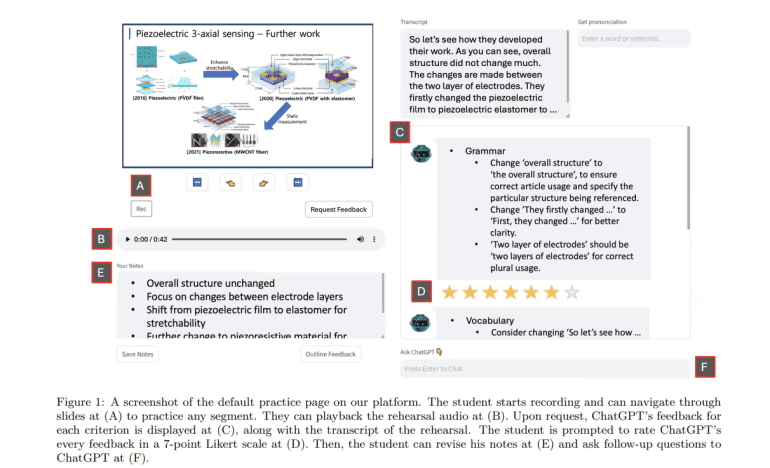- KAIST introduces CHOP, a ChatGPT-based platform for EFL students’ oral presentations.
- Aimed at improving communication skills crucial for academic and professional success.
- Addresses challenges like speech anxiety and limited feedback in traditional methods.
- CHOP provides real-time, personalized feedback on grammar, vocabulary, content, organization, and delivery.
- Tested with 13 students, showing high accuracy in feedback quality, especially in vocabulary improvement.
- Students report increased confidence, improved self-assessment skills, and better awareness of strengths and weaknesses.
- Challenges include interpretability issues in delivery feedback from SuperSpeech API.
Main AI News:
The realm of English as a Foreign Language (EFL) revolves around equipping non-native speakers with effective English communication skills. A pivotal component of this pedagogy involves cultivating students’ oral presentation prowess, essential for both academic and professional triumphs, enabling them to articulate their ideas with clarity and confidence. By practicing effective oral presentations, EFL learners refine their communication competencies, preparing them for real-world scenarios.
EFL students encounter significant hurdles in delivering oral presentations, including speech anxiety, limited vocabulary, and insufficient feedback from traditional teaching methods, hindering effective presentation. These challenges underscore the necessity for innovative tools that offer interactive, personalized support to help students surmount these obstacles and enhance their presentation abilities.
Existing methodologies supporting EFL students include workshops and digital tools that provide additional practice opportunities and feedback. Digital video recordings and video blogs have bolstered students’ presentation skills, yet there remains a demand for more personalized, real-time feedback to meet the dynamic needs of EFL learners, addressing gaps in effective support mechanisms.
KAIST researchers in South Korea have introduced CHOP (ChatGPT-based interactive platform for oral presentation practice), a pioneering tool leveraging ChatGPT to furnish personalized feedback to EFL students on their oral presentations. By integrating advanced AI technologies, CHOP aims to refine students’ practice sessions and augment their presentation abilities in an organized, interactive manner.
CHOP harnesses technologies such as ChatGPT and Whisper to generate real-time feedback. The platform evaluates presentations based on criteria encompassing grammar, vocabulary, content, organization, and delivery. Students receive detailed feedback on their rehearsals, empowering them to identify and rectify specific errors, thus comprehensively enhancing their presentation skills by targeting individual areas for improvement with precision.
To validate its efficacy, CHOP underwent testing with 13 EFL students over a fortnight. During this period, the platform accrued interaction data, including rehearsal audio, ChatGPT-generated feedback, user evaluations, chat logs, and platform usage statistics. Expert assessments of feedback quality affirmed CHOP’s accuracy and relevance, scoring 5.66/7 and 5.8/7 respectively. The platform excelled in enhancing vocabulary, garnering a top accuracy score of 6.17/7 from experts and a helpfulness rating of 6.02/7 from students.
Despite its strengths, CHOP exhibited limitations in delivery feedback, scoring lower in detail and utility (4.81/7). Both experts and students noted ambiguities in inputs, particularly in understanding the rationale behind varied delivery assessments. This constraint arose from interpretability issues inherent in the SuperSpeech API utilized for delivery assessment, highlighting the need for more transparent and comprehensive feedback mechanisms in this domain.
Students’ reception of CHOP was largely affirmative. The platform notably bolstered students’ confidence and allayed anxiety, earning an average rating of 5.26/7. Students also reported enhanced self-assessment skills and heightened awareness of their strengths and weaknesses, with ratings of 5.27/7. These findings underscore CHOP’s potential to fortify learners’ confidence and self-evaluation capabilities, effectively tackling primary challenges encountered by EFL students in oral presentations.
Usage patterns unveiled students’ preference for partial rehearsals to refine segments meticulously, followed by full rehearsals for comprehensive assessments. This approach facilitated fine-tuning of minor details while offering broader insights into their presentation skills. However, challenges arose in interpreting feedback from extended rehearsals, necessitating enhancements in feedback context and relevance.
Conclusion:
The introduction of CHOP marks a significant advancement in EFL education, leveraging AI to provide personalized feedback and address longstanding challenges in oral presentation training. Its success in improving students’ confidence and self-evaluation capabilities underscores its potential to reshape how language skills are cultivated in academic and professional settings.

